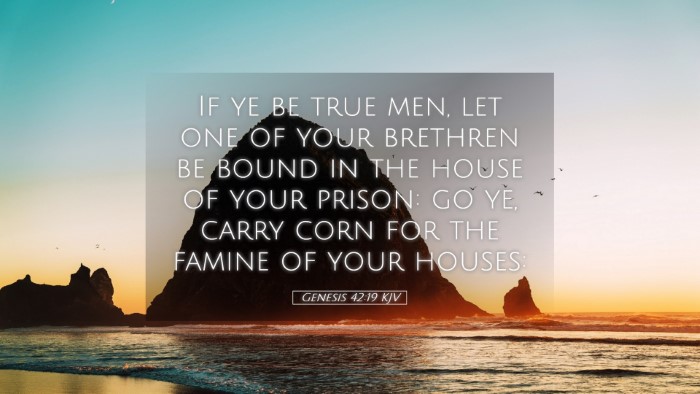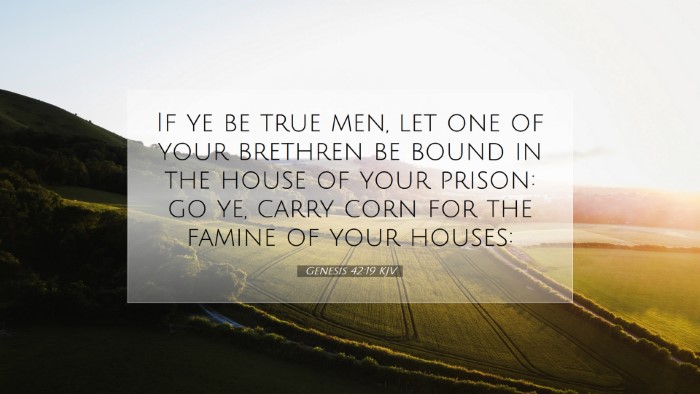Commentary on Genesis 42:19
Verse Text: "If you are honest men, let one of your brothers stay here in prison, while the rest of you go and take grain back for your starving households."
Introduction
Genesis 42:19 occurs within the larger narrative of Joseph's encounters with his brothers during the famine that struck the land. The underlying themes of honesty, repentance, and divine providence are prevalent throughout this segment of Scripture. This commentary will explore insights from notable public domain commentators such as Matthew Henry, Albert Barnes, and Adam Clarke, providing a comprehensive understanding of the verse's implications.
Context and Background
The context of Genesis 42 portrays a significant turning point where Joseph, now a powerful figure in Egypt, encounters his brothers who come seeking sustenance. The brothers are unaware of Joseph's identity, and their subsequent trials serve to reveal their character and past transgressions.
Character of Joseph
Joseph's role necessitates not only the administration of Egypt's resources but also a means of testing his brothers. According to Henry, Joseph's treatment of his brothers can be viewed as a strategic means of bringing them to a place of humility and reflection on their past sins. By imposing conditions on the brothers, he provides them with an opportunity to demonstrate their honesty.
Thematic Insights
Honesty and Integrity
The pivotal phrase "If you are honest men" indicates that Joseph desires to ascertain the genuineness of his brothers' character. Barnes emphasizes that this statement serves as both a challenge and a test. It underscores the reality of their past actions regarding Joseph's own betrayal and the hope for their possible redemption.
Repentance and Restoration
The condition set forth by Joseph, that one brother remain while the others fetch grain, further illustrates a path towards repentance. Adam Clarke notes that this arrangement forced the brothers to confront their past: their guilt regarding Joseph's sale and the broken relationship with their father. The situation required them to display unity and responsibility, thus leading to a gradual restoration of familial bonds.
Joseph's Strategy and Test
Joseph's method of dealing with his brothers reveals both wisdom and cunning. He understands their psychological state and utilizes it to promote a self-reflective process in them. By holding one brother hostage, he elevates the stakes for the returning group. This, as Matthew Henry points out, exemplifies a divine orchestration where the brothers are compelled to reckon with their integrity before God and one another.
Divine Providence
Throughout the narrative, a belief in divine providence is evident. The events leading up to this moment reflect God's overarching plan. Joseph, while appearing to act independently, is guided by God’s hand. Barnes notes that this circumstance was not merely an arbitrary punishment, but a means through which God would ultimately work toward the redemption and reconciliation of the family.
Practical Applications
For pastors, scholars, and students of the Bible, Genesis 42:19 serves as a reminder of the importance of integrity in relationships and the necessity of facing past sins. The brothers' experience illustrates the profound journey from guilt to forgiveness and the importance of truthful self-examination.
Lessons in Leadership
Joseph's leadership in this scenario exemplifies the need for wisdom and discernment in handling difficult circumstances. Church leaders are encouraged to learn from Joseph’s ability to balance justice with mercy — an essential trait for effective ministry.
Encouragement for Repentance
This passage offers encouragement for those grappling with their past. Just as the brothers were given the chance to amend their faults, individuals today are reminded that repentance is always possible through confession and the grace found in Christ.
Conclusion
Genesis 42:19 encapsulates the themes of honesty, repentance, and the testing of character. Through the insights drawn from the works of Matthew Henry, Albert Barnes, and Adam Clarke, we see a multi-faceted understanding of how the past influences the present and the means by which God works through our circumstances to invite us towards growth and reconciliation.


